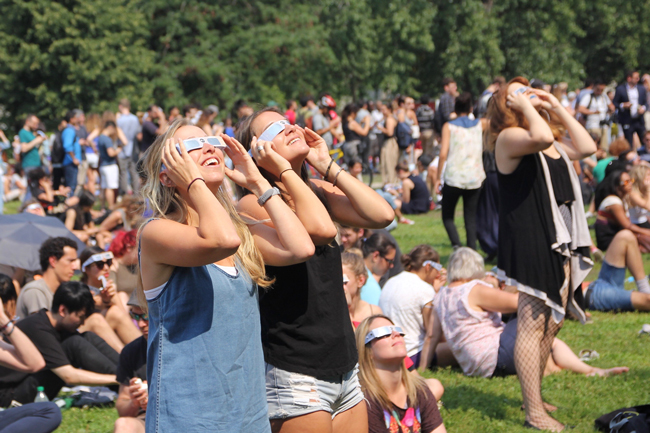
At approximately 3:20 p.m. on April 8, the sky above Montreal will go dark during a total eclipse of the sun. A rare celestial occurrence, the next total solar eclipse won’t happen in Montreal until the next century. “A total eclipse of the sun is a once-in-a-lifetime opportunity,” says Carolina Cruz-Vinaccia, Outreach Program Administrator at McGill’s Trottier Space Institute (TSI). “You really don’t want to miss it.”
McGill is making sure everyone can get the most out of this astronomical phenomenon – on and off the Island of Montreal.
A series of eclipse-related events will be held on the Downtown campus, at Macdonald Campus, and the Gault Nature Reserve on Mont Saint-Hilaire. More than just watch parties, all three events have much more on tap, including educational fare, interactive activities, and lots of fun for young and old.
And, yes, free eclipse glasses – and safety information – will be distributed at all three venues.
Downtown campus Eclipse Fair and Viewing Party (1 to 4:30 p.m.)
Downtown campus knows a thing or two about a good eclipse party. In 2017, thousands of people gathered on Lower Field to observe a partial eclipse of the sun. This time around, of course, things could be a lot bigger.
Organized by the TSI and the Department of Physics, the Eclipse Fair and Viewing Party will run from 1 to 4:30 pm, with hands-on activities, demos, and booths for all ages to explore the science behind eclipses and other fascinating facets of solar physics. The Fair will include everything from a cloud chamber and make-your-own-pinhole-viewer kiosk, to a scale solar system model, and opportunities to view the sun through solar telescopes.
Gearing up for the big day, the group has a team of graduate students going to local schools to present an eclipse module as part of McGill’s Space Explorer outreach program. Presentations will also be done at the Côte Saint-Lu Public Library on April 3, and the Ecomuseum on April 6.
For people thinking about buying eclipse glasses from non-certified sellers, Cruz-Vinaccia has this advice: Do your research and only buy from reputable sellers like the ones listed by the American Astronomical Society.
Learn more about the downtown Eclipse Fair and Viewing Party
Macdonald Campus-John Abbott event (2 to 5 p.m.)
The eclipse event on the West Island is a collaborative effort between Macdonald Campus and John Abbott College, along with a host of partners that include the Royal Astronomical Society of Canada, MDA Space, the Planétarium, the Canadian Space Agency, and Let’s Talk Science at McGill.
The oval lawn in front of John Abbott College will serve as the eclipse hub. Information kiosks and activity stations will include multiple solar telescopes with special filters, and large-scale pinhole viewers. Children will be able to make their own pinhole viewer and help create a community mural.
Events will start at 2 p.m. but organizers figure the crowd will peak between 3 and 3:45, with totality happening sometime around 3:20. The activities will run until 5.
A number of activities will be run by the McGill branch of Let’s Talk Science, a national not-for-profit organization dedicated to creating STEM programming to children and adults. Throughout the year, McGill students organize and deliver hands-on outreach programs to the Montreal community.
Ingrid Chiraz, Project Administrator, Office of Student Academic Services, says that everyone should go to one of the eclipse events in Montreal. “It’s a great opportunity to learn something new,” she says. “Who isn’t curious about the world around us and the universe? You’re never too old, or too young, to learn something new.
Learn more about the Macdonald Campus-John Abbott event
Gault Nature Reserve (2 to 5 p.m.)
Not surprisingly, the Gault Nature Reserve of McGill University will put its own green stamp on the proceedings.
Upon arriving at the Alice Johannsen Welcome Centre, visitors will be able to learn about the science behind eclipses. The information will be prepared by members of the Trottier Space Institute and the Department of Physics. After getting their free eclipse glasses, visitors will be able to hike to a summit for optimum viewing.
“It might be the best place to watch the eclipse,” says Frédérique Truchon, Communications Associate at Gault. “The summit gives a wonderful view of the region so that when it gets dark, you will see it across the whole landscape.”
People with limited mobility will still be able to take part in activities and watch the eclipse from lower grounds.
Participants are encouraged to wear proper footwear, keeping in mind that in April trails can be muddy or even icy. People should also bring headlamps or flashlights as the trail will be dark during the peak of the eclipse.
To take part in the Gault experience, people must already have an annual pass or reserve a daily pass before their arrival. Passes must be purchased online. Carpooling is also recommended as parking is limited.
Learn more about watching the eclipse at the Gault Nature Reserve
Organizers of all three events say that activities will still take place in the event of a cloudy day.
Montrealers who can’t make it to one of the eclipse viewing events but still want to watch the eclipse can get a free pair of eclipse glasses from any of the city’s 45 libraries.
